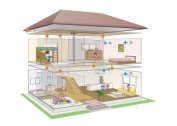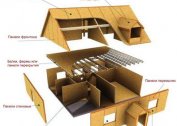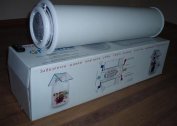A ventilation system is a necessary attribute of a private house. After all, the microclimate in the house depends on its quality - so that it is warm and dry. It is for this that you should familiarize yourself with all types of ventilation, their pros and cons, and choose the best option.
Forced ventilation
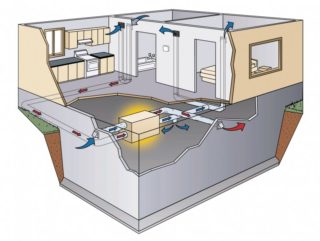 The work of the air handling unit is to supply fresh, clean air, without impurities and odors into the room, while heating it to the set temperature. Filtration occurs by entering the air masses into the vent valve, where it undergoes certain processing, and then enters the room without pollutants. As for the temperature level - the installation can work both for heating and cooling, depending on the desired result.
The work of the air handling unit is to supply fresh, clean air, without impurities and odors into the room, while heating it to the set temperature. Filtration occurs by entering the air masses into the vent valve, where it undergoes certain processing, and then enters the room without pollutants. As for the temperature level - the installation can work both for heating and cooling, depending on the desired result.
As a result of the operation of the air handling unit, high pressure is generated due to the volumetric influx of fresh air without forced exhaust exhaust. The exit of polluted air occurs naturally - through cracks in the windows and doors.
Pros:
- Effective air supply to the room;
- external air filtration;
- heating and cooling of the incoming air;
- low noise.
Minuses:
- the need for professional calculation and design
- large dimensions of the air handling unit
Exhaust ventilation
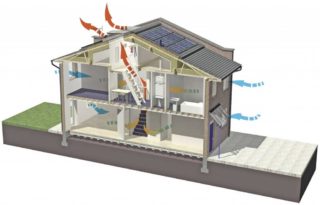 The main task of exhaust ventilation is to remove polluted air from the room. For this, special exhaust fans are used, which pull the polluted air masses into the street.
The main task of exhaust ventilation is to remove polluted air from the room. For this, special exhaust fans are used, which pull the polluted air masses into the street.
Pros:
Large selection of fans and additional accessories for them.
Minuses:
- An exhaust installation is difficult to install after building a house. Therefore, it must be designed in advance.
- High power consumption.
Supply and exhaust ventilation
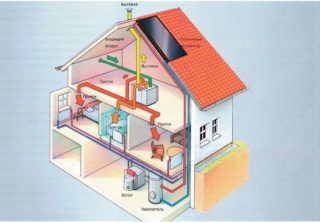 The device of the supply and exhaust ventilation system is a rather difficult task. To install it, it is necessary to lay special air channels throughout the house, which will be responsible for the receipt of fresh air masses. Also, laying exhaust ducts is needed. Air is supplied by a fan, which is located on the street.
The device of the supply and exhaust ventilation system is a rather difficult task. To install it, it is necessary to lay special air channels throughout the house, which will be responsible for the receipt of fresh air masses. Also, laying exhaust ducts is needed. Air is supplied by a fan, which is located on the street.
A special device is installed in the room - a convector. He is needed to clean the street air that enters the house. Also, the convector has the function of heating or cooling the room.
The principle of operation of the supply and exhaust ventilation system is based on the differential pressure of air masses. The fan, under high pressure, launches fresh air into the house. And as a result of a sharp pressure drop, the contaminated is pushed through the exhaust ducts.
Pros:
The system is purchased in full. Accordingly, the unforced costs of additional items for ventilation are not needed.
Minuses:
- It will be necessary to periodically clean the channels, as they are easily contaminated.
- The system can freeze in the cold season, if it is turned off for a long time.
- If miscalculations were made during installation, dirty air will not leave the room.
- The system will work effectively only during the passing season, since its operation depends on the difference in temperature conditions.
Natural ventilation
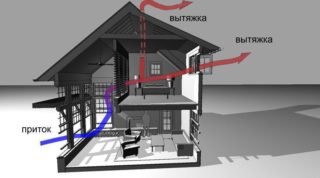 Natural ventilation should be installed if funds are limited. You can do it with the help of air valves. There are two types of them: supply and exhaust. Supply valves are located under the windowsills above the batteries. Here the best flow of air coming from the street, which will be heated in the winter time from the battery itself. Exhaust should be installed on the opposite wall.This is done to organize air flow. It is also possible that the supply and exhaust valves are located in adjacent rooms.
Natural ventilation should be installed if funds are limited. You can do it with the help of air valves. There are two types of them: supply and exhaust. Supply valves are located under the windowsills above the batteries. Here the best flow of air coming from the street, which will be heated in the winter time from the battery itself. Exhaust should be installed on the opposite wall.This is done to organize air flow. It is also possible that the supply and exhaust valves are located in adjacent rooms.
Pros:
- Simple construction.
- Good air circulation.
- Ability to improve the work with the help of additional devices.
Minuses:
- Inability to regulate incoming and outgoing air flows.
- Dependence on weather outside the home, especially wind or lack thereof.
- Requires careful monitoring, cleaning and repair.
Forced ventilation
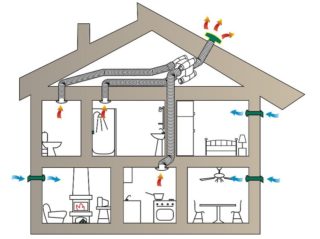 Forced ventilation differs from the rest in many additional devices and complexity in its device. It consists of the following elements:
Forced ventilation differs from the rest in many additional devices and complexity in its device. It consists of the following elements:
- air intake grill, which provides protection against dust and small objects getting into the system;
- a filter with different degrees of purification, for purification of incoming air;
- air valve, which is necessary to block the incoming air in the off state;
- air heater - a device that is responsible for heating the air. Heaters can be electric and water. It is the latter that are best used for a private house, because they can cope with a large flow of air masses;
- silencer, which is used for quiet operation of the installation;
- a fan that creates the desired pressure inside the system;
- air duct to distribute the movement of air in the room;
- air distributors, devices that supply air to a specific section of the house;
- automatic control system that monitors the operation of the ventilation system.
Depending on the distribution of air and the area of the house, forced ventilation can be local or general exchange. The local system is responsible for a specific area of the room - it is suitable for large houses. The general exchange system ventilates the air throughout the room. Therefore, it is better to place it in small houses.
Pros:
- It is not affected by the weather outside the house.
- Huge selection of systems - you can choose a system depending on the required characteristics.
- The fan has both supply and exhaust modes.
- It cleans the air, making it always fresh in the house.
Minuses:
- Has a great cash value.
- Very laborious installation system.
- High power consumption of the system.
Emergency ventilation
Emergency ventilation is installed as an additional, backup ventilation duct, which opens automatically as a result of an emergency (fire, high humidity, etc.). There are no pros and cons of emergency ventilation, since this is a necessity for home safety.
Choosing a ventilation system for a private house is a difficult task. However, if you competently approach the choice, evaluate all the pros and cons of each installation, then the microclimate in the house will be under reliable and high-quality protection.
